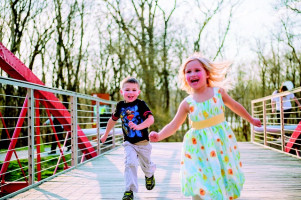
Cancer deaths in children and young people have fallen by 58 per cent in the past 40 years, according to new figures announced by Cancer Research UK.
Progress in treating the disease has led to this unprecedented drop among youngsters aged 24 and under, with around 1,300 deaths each year in the mid-1970s dropping to around 550 deaths today.
The steepest decline was in leukaemia, where the average number of deaths dropped by 39 per cent in the past 10 years, falling from around 180 deaths each year to around 110.
Despite this, cancer remains the biggest killer of children and young people in the UK, with around 550 young lives lost to the disease every year, many from brain tumours.
Professor Pam Kearns, director of the Cancer Research UK Clinical Trials Unit in Birmingham, said: “These figures are testament to the real progress we’re making in treating children and young people with cancer. Cancer Research UK has been instrumental in this progress. But hundreds of young people are dying from cancer each year in the UK, which means there’s still much more we need to do.”
Despite improvements in survival, cancer has a huge impact on youngsters. Children can face months of painful treatment, as well as the upset of being away from home and friends and unfortunately some face living with long-term side-effects from their treatment, such as infertility, and disability, which have an impact throughout their adult lives.
Professor Kearns added: “Every day, I see the extreme bravery of children and young people going through difficult treatments. Whilst many go on to live full lives, they may have to deal with the side-effects of treatment for years to come. So it is vital that we continue to increase funding for research into kinder and better treatments that will offer new hope to children and their families.”
The new figures are announced as the charity launches Cancer Research UK Kids & Teens – an ongoing campaign to fund more research to find better, kinder treatments and cures to beat cancer in younger people sooner.
Fiona Barnett from Wimbledon, whose son Rufus was diagnosed with leukaemia aged six and attended a reception hosted by Samantha Cameron at 10 Downing Street this week to launch the campaign, said: “When they told me it was leukaemia my first question was ‘is he going to die?’ Treatment started immediately and over the course of that first year Rufus had to endure seemingly nonstop lumbar punctures, injections and general anaesthetics, not to mention infections, horrible medicines and hideous side-effects. It felt like it would never end, but one year after diagnosis we were so relieved to hear that Rufus was responding well, which indicated that he had a very good chance of complete recovery.
"We would like to thank all the doctors and nurses who continue to care for Rufus for the duration of his treatment, and for that wonderful moment when we were given genuine hope for him beating this horrible disease. It is also impossible to ignore the decades of research that have given us the chance of a happy ending, and that have ensured that the treatment Rufus receives has the potential to be so successful, for that we will be forever grateful."
Around 1,600 children and a further 2,200 teenagers and young adults are diagnosed with cancer every year in the UK.
Overall ten-year survival for cancer in children aged 14 and under has almost tripled since the 1960s, with around three quarters of children with cancer now cured.
But survival is significantly lower in teenagers and young adults than in children, for several cancer types.
Harpal Kumar, Cancer Research UK’s chief executive, said: “Cancer causes more deaths among children and young people than any other disease in the UK, so it’s hugely encouraging to see that death toll now falling steadily. But as the largest funder of research into children’s cancers in the UK, we will keep going until no young lives are lost to cancer.
“Money raised by ‘Cancer Research UK Kids & Teens’ will be restricted to research into cancers affecting children, teenagers and young adults, enabling us to better understand these cancers and find better and kinder treatments and cures. In the next 5-10 years Cancer Research UK hopes to double the amount it spends on these cancers.”
Source: Cancer Research UK
The World Cancer Declaration recognises that to make major reductions in premature deaths, innovative education and training opportunities for healthcare workers in all disciplines of cancer control need to improve significantly.
ecancer plays a critical part in improving access to education for medical professionals.
Every day we help doctors, nurses, patients and their advocates to further their knowledge and improve the quality of care. Please make a donation to support our ongoing work.
Thank you for your support.